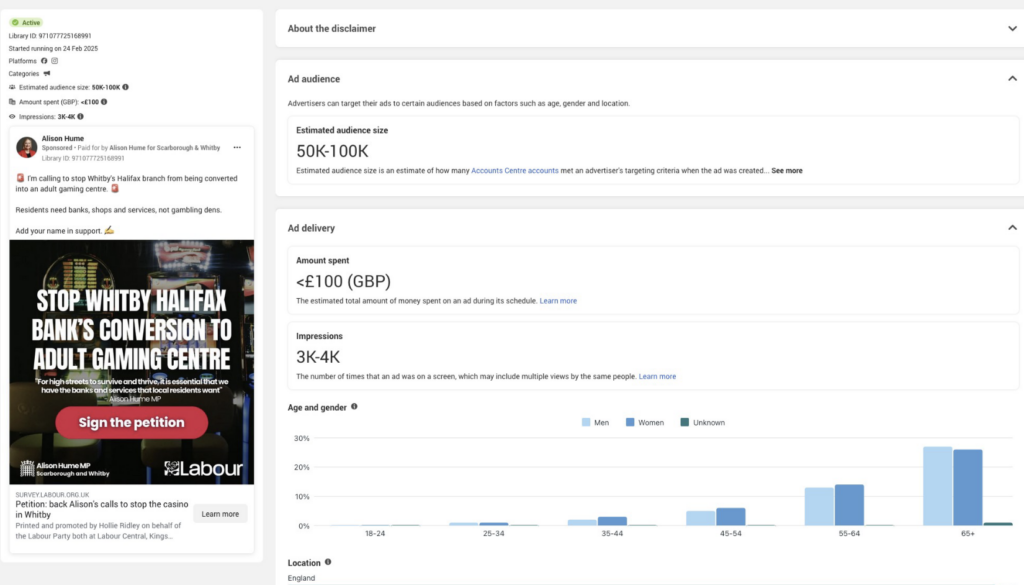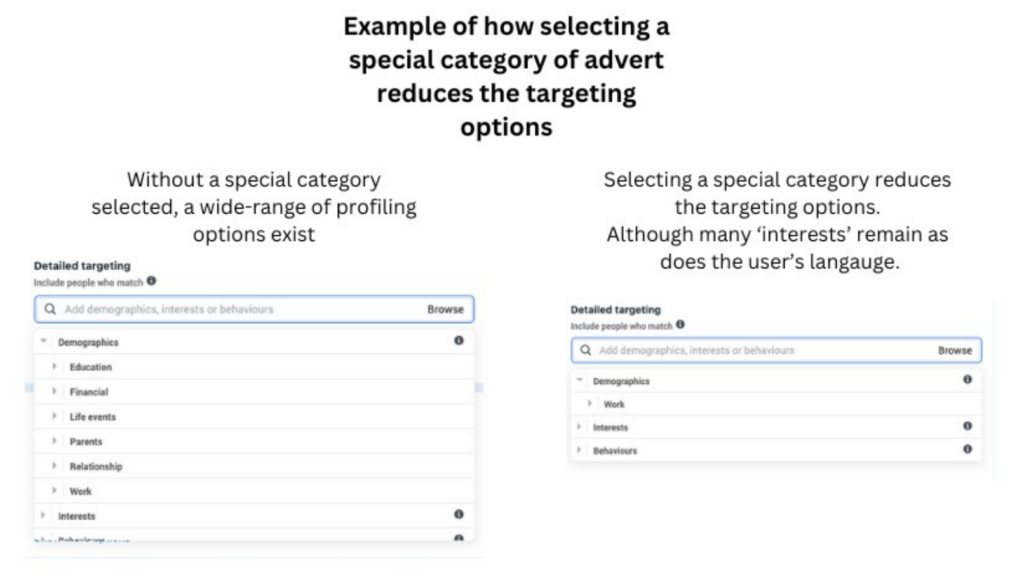
Meta Requires More Transparency About Anti-Gambling Ads Than Gambling Ads
A new report by digital rights campaigners Open Rights Group (ORG) has highlighted that Meta requires more transparency about adverts that highlight the harms of gambling than about adverts that promote gambling. Profiling by Proxy: How Meta’s Data Driven Ads Fuel Discrimination examines the harms caused by Meta’s intrusive profiling of its users.
Transparency in Meta’s ad library
Meta’s Ad Library is a searchable directory of ads, which shows who placed an advert and how much they have spent advertising on Meta, as well as information about paid partnerships between content creators and brands.
The library can be used to monitor ads and advertisers. Adverts that Meta categorises as ‘political’ are subject to more rigorous transparency requirements than regular ads, with Meta’s ad library showing the breakdown by age and gender of users who have been shown them. This information is not available for mainstream ads, including gambling ads. ORG is calling for all ads on Meta platforms to be subject to more rigorous levels of transparency so that Meta and advertisers can be held to account.
ORG is also calling for access to Meta’s ad library to be freely available. Currently, the library is only accessible by logging into a Meta account, which places abarrier to transparency and accountability, and forces people to hand over their personal data to Meta if they want to scrutinise ad placing.


Data profiling
Facebook and Instagram collect, store and analyse thousands of data points about each individual user, which are used to build profiles that enable advertisers to find audiences that are most likely to respond to their adverts. Advertisers can select from extensive lists of interests, behaviours and other characteristics which have been automatically assigned to an individual user by Meta’s AI. Data profiling enabled Meta to earn over $160 billion from advertising revenue in 2024.
There are some targeting restrictions for ads that fall into special categories. These include political adverts and adverts categorised as ‘Financial Products and Services’. While there are some specific requirements for gambling ads, they do not fall into the latter category, and there are therefore less restrictions on how they target audiences. If gambling was included in Financial Products and Services, or subject to the same restrictions, it would mean that gambling ads would be more restricted in how they could target users.
Discrimination
Meta guidelines say that all ads must not discriminate against people based on ‘personal attributes such as race, ethnicity, colour, national origin, religion, age, sex, sexual orientation, gender identity, family status, disability, medical or genetic condition’. Advertisers are not allowed to use audience selection tools to either target people for advertising or exclude people from seeing adverts in ways that result in discrimination on these grounds. However, as the report shows, Meta allows advertisers to create ‘proxies’ for these characteristics, which allows companies to get around these laws – whether they intend to or not.
The kind of targteting that Meta offers means that while gambling companies can’t specifically select people on lower incomes, they can eg select a number of ‘Interests’ that could indicate someone is on a lower income and therefore may be more susceptible to gambling ads. for example, they could target ads to people who are living in rented accommodation rather than homeowners or to people who are looking for work, and who therefore may be in need of money.

Meta pixel
These issues are made worse by the Meta Pixel, which is embedded in non- Meta websites and sends data about their visitors back to Meta.
Earlier this year, an Observer investigation found that the Meta Pixel had been sending data about people visiting gambling websites, without their consent. This can then be used by Meta in their ad targeting, potentially meaning people with problematic gambling habits could be flooded with gambling adverts on Facebook or Instagram.
Quotes
Anna Dent who authored the report for ORG said:
“Even though Meta has introduced new restrictions on ad targeting, the sheer amount of data it holds on its users means ads can still discriminate and cause harm. As Meta introduces more AI to its ad platform, the potential for hidden harms which no-one is accountable for just grows.”
James Baker, ORG Platform Power Programme Manager, said:
“It is wrong that Meta publishes more information about how anti-gambling ads are targeted than it does about gambling ads. Meta needs to be more transparent and accountable about how all ads are targeted.
“They also need to urgently respond to the thousands of people who have requested that Meta respect the law and stop targeting ads to them based on their personal data.
“If Meta were to target ads when users’ gave their explicit consent, it would help to mitigate some of the harms of targeted advertising.”
Opt-Out of Stalker Ads
Since Meta settled a legal case with campaigner Tanya O’Carroll, thousands of people in the UK have used tools provided by ORG, the Good Law Project and Eko to exercise their right to opt out of profiling by Meta under GDPR. Others have contacted the social media giant directly. But Meta has not fufilled these requests.
Click on the banner below to opt-out of your personal being used to sell targeted adverts on Meta using our tool.


